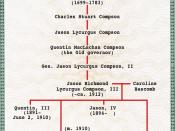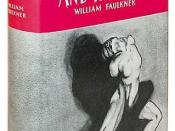The main action of William Faulkner's The Sound and the Fury occurs during Easter Week, 1928. Because Easter is the holiest event in the Christian calendar, and because the Passion Week serves as the book's main organizing device, many readers have sensed the presence of religious themes in this often opaque work. But over the past five decades, critical interpretations have ranged from Christian spirituality to existential nothingness. While there has been no consensus on the meaning of the novel, Faulkner scholars have agreed over the years that the structure of The Sound and the Fury follows the Modernist "mythical method." Much as the Odyssey gives form and sequence to Joyce's Ulysses, episodes and images from the Christian Holy Week provide an external framework to Faulkner's narrative. Members of the Compson family undergo experiences which rehearse episodes from the last days of Jesus's life. The four sections of the novel form four Compson gospels, which like the biblical originals develop and expand the story they retell.
These parallels to the gospel tradition are most insistent during the Sunday church service in the fourth section of The Sound and the Fury. By means of his powerful if unorthodox rendition of the Passion narrative, the Reverend Shegog wakens in Dilsey capacities for spiritual renewal. Her visionary Easter experience then rouses her to secular acts of rejection and affirmation.
Dilsey Gibson, the kindly and long-suffering domestic worker at the Compson place, is the major non-Compson character in The Sound and the Fury. A long-standing scholarly interpretation is that Dilsey represents a moral norm in the decadent Compson world and her actions set a standard of humane behavior. Opposing such a "religious" reading of the novel is the nihilistic view, in which Dilsey's Christianity is meaningless or irrelevant. Both approaches tend to regard Dilsey,


